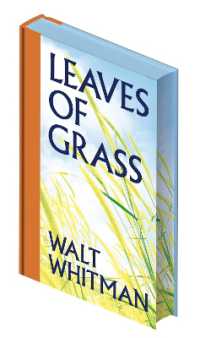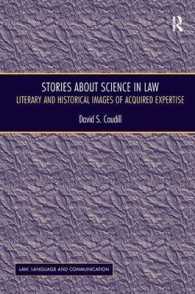- ホーム
- > 洋書
- > 英文書
- > Cinema / Film
Full Description
Most histories of Soviet cinema portray the 1970s as a period of stagnation with the gradual decline of the film industry. This book, however, examines Soviet film and television of the era as mature industries articulating diverse cultural values via new genre models. During the 1970s, Soviet cinema and television developed a parallel system of genres where television texts celebrated conservative consensus while films manifested symptoms of ideological and social crises. The book examines the genres of state-sponsored epic films, police procedural, comedy and melodrama, and outlines how television gradually emerged as the major form of Russo-Soviet popular culture. Through close analysis of well-known film classics of the period as well as less familiar films and television series, this groundbreaking work helps to deconstruct the myth of this era as a time of cultural and economic stagnation and also helps us to understand the persistence of this myth in the collective memory of Putin-era Russia. This monograph is the first book-length English-language study of film and television genres of the late Soviet era.
Contents
Table of Contents:
Acknowledgements
Introduction
0.1. Approaches to Film and Television Genres
0.2. Why Television?
0.3. The Difficult Fate of Genre Studies in the USSR and Russia
0.4. Overview of Chapters: from Socialist Realism to Film Genres
Chapter 1. Epic Film as a Tool of Hard and Soft Power during the Cold War.
1.1. Syntax and Semantics of the Genre
1.2. War and Peace: Art Cinema on State Service
1.3. Liberation: War Spectacle and the Politics of Memory
1.4. Postscriptum: The Revival of Prestige Productions under Putin
Chapter 2. The Socialist Television Police Procedural of the 1970s and 80s: Teaching Soviet Citizens How to Behave.
2.1. Syntax and Semantics of the Genre
2.2. The Investigation Is Conducted by Experts: The Soviet Police Procedural Is Born
2.3. The Meeting Place Cannot Be Changed: The Romantics of Criminal Underworld
2.4. Postscriptum: Streetwise Cops Meet the Russian Mafia
Chapter 3. Late-Soviet Comedy: Between Rebellion and the Status Quo.
3.1. Syntax and Semantics of the Genre
3.2. El'dar Riazanov: The Trappings and Traps of Private Life
3.3. Mark Zakharov's Television Films: Between the Romance and the Sitcom
3.4. Postscriptum: The Living and the (Un)Dead
Chapter 4. Reinventing Desire: Late-socialist Melodrama
4.1. Syntax and Semantics of the Genre
4.2. Television Melodrama
4.3. Cinematic Masculinities
4.4. Late-Soviet Woman's Film
4.5. Postscriptum: Televised Passions
Conclusion
Bibliography
Filmography
Index







